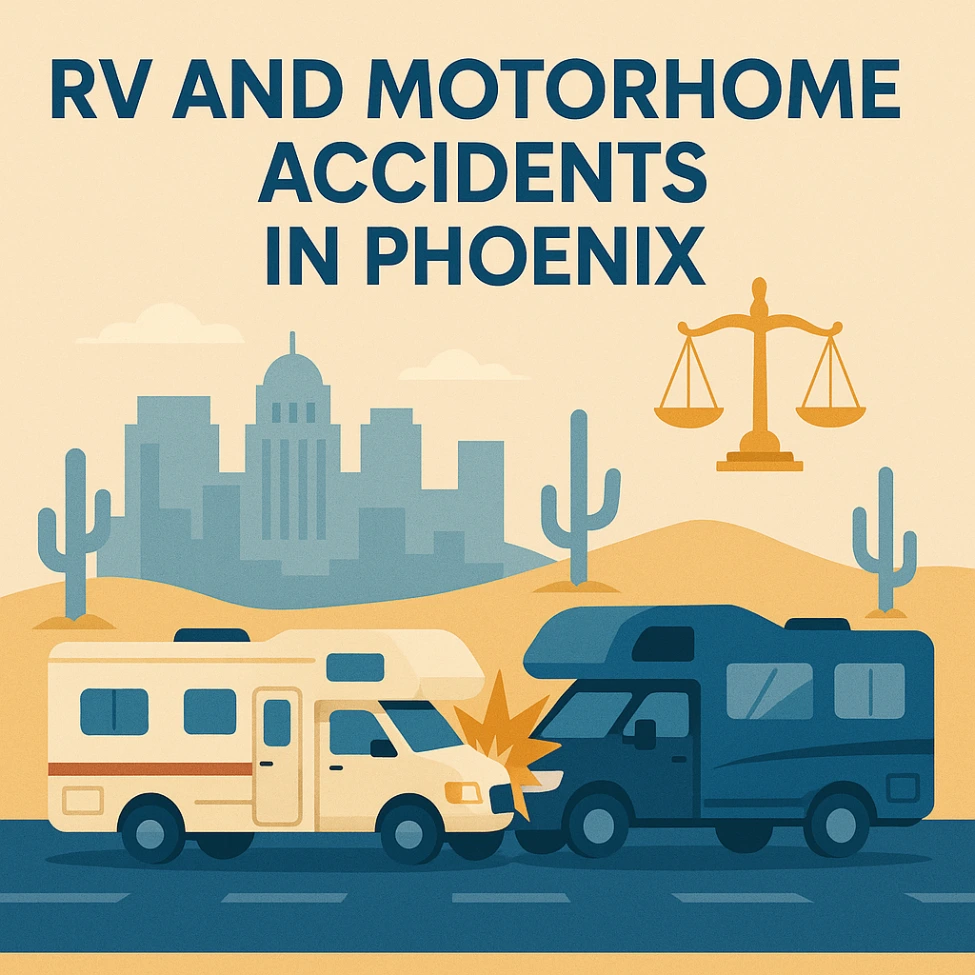Understanding RV and Motorhome Accidents in Arizona
Phoenix’s popularity as both a tourist destination and retirement community has contributed to a significant number of recreational vehicles (RVs) and motorhomes on Arizona roadways. The unique challenges of operating these large vehicles in urban areas like Phoenix create distinct safety concerns and legal considerations when accidents occur.
Common Causes of RV and Motorhome Accidents in Phoenix
Several factors contribute to the frequency of RV accidents in the Phoenix metropolitan area:
- Driver Inexperience: Many RV operators lack specialized training for handling these large vehicles, particularly on Phoenix’s busy highways like I-10, I-17, and Loop 101.
- Blind Spots: The significant blind spots on motorhomes and RVs make lane changes particularly hazardous, especially in heavy traffic areas like downtown Phoenix.
- Weight Distribution: Improper loading can lead to dangerous handling characteristics, rollovers, and jackknifing, particularly on curved freeway interchanges.
- Crosswinds: Arizona’s open desert highways make RVs vulnerable to strong crosswinds, a particular concern on routes connecting Phoenix to popular destinations like Flagstaff and Tucson.
- Tire Blowouts: Arizona’s extreme summer heat accelerates tire wear and increases blowout risks, especially concerning given an RV’s weight and handling characteristics.
- Braking Distance: The extended stopping distance required for large motorhomes creates accident risks in Phoenix’s stop-and-go traffic.
- Heat-Related Equipment Failures: Phoenix’s extreme temperatures cause more frequent overheating and mechanical failures in RVs compared to passenger vehicles.
Arizona RV Accident Statistics
While specific Phoenix statistics for RV accidents are limited, Arizona Department of Transportation data indicates:
- Approximately 2-3% of all commercial vehicle accidents in Arizona involve recreational vehicles
- The peak months for RV accidents coincide with Arizona’s high tourist seasons (January-March and October-November)
- Rural highways connecting Phoenix to recreational areas experience the highest concentration of serious RV accidents
Legal Considerations for RV Accidents in Phoenix
RV and motorhome accidents present unique legal challenges:
Driver Licensing Requirements
Arizona does not require special licenses for most personal-use RVs (Class A, B, or C) unless they exceed 26,000 pounds. However, this lack of specialized licensing requirements doesn’t diminish an operator’s duty of care. Courts may consider whether a driver had adequate experience or training when determining liability.
Multiple Liability Parties
RV accident liability may extend beyond just the driver to include:
- RV rental companies
- Vehicle or component manufacturers
- Maintenance facilities
- Other negligent drivers
Insurance Complications
RV insurance policies often have different coverage structures than standard auto policies, including:
- Higher liability limits
- Separate coverage for living quarters versus vehicle components
- Coverage exclusions for commercial use or extended full-time living
RV Safety Regulations in Arizona
Arizona’s regulations for RVs include:
- Maximum length restrictions (40 feet for single vehicles, 65 feet for combination vehicles)
- Width restrictions of 8.5 feet
- Height restrictions of 13.5 feet
- Specific requirements for safety equipment including fire extinguishers and smoke detectors
- Required annual emissions testing in the Phoenix metro area for certain RVs
Compensation in Phoenix RV Accident Cases
Victims of RV accidents in Phoenix may be entitled to compensation for:
- Medical expenses (immediate and long-term)
- Lost income and diminished earning capacity
- Property damage
- Pain and suffering
- Loss of enjoyment of life
- In fatal cases, wrongful death damages
Arizona’s Comparative Negligence System
Arizona follows a “pure comparative negligence” system, meaning accident victims can recover damages even if they were partially at fault, though their recovery will be reduced by their percentage of fault. This is particularly relevant in RV accident cases where multiple factors often contribute to the collision.
RV Accident Prevention Tips for Phoenix Drivers
The Arizona Department of Transportation recommends several safety measures for RV operators in Phoenix:
- Perform thorough pre-trip inspections, especially of tires and braking systems
- Undergo voluntary training specific to RV operation before traveling
- Avoid driving during peak traffic hours in Phoenix (7-9 AM and 4-6 PM weekdays)
- Be aware of height clearances, particularly on surface streets with older infrastructure
- Use designated RV routes whenever possible
- Maintain greater following distance than with passenger vehicles
- Take weather conditions seriously, especially summer heat and monsoon storms
Popular RV Destinations Around Phoenix with Higher Accident Rates
Some routes connecting Phoenix to popular RV destinations see higher accident rates:
- I-17 between Phoenix and Flagstaff, particularly the steep grades near Black Canyon City
- US-60 between Phoenix and Globe
- Routes connecting to Lake Pleasant Regional Park
- Roads around popular RV parks in Mesa, Apache Junction, and Surprise
Where to Get Legal Help After an RV Accident in Phoenix
If you’ve been involved in an RV accident in Phoenix, seeking experienced legal guidance is crucial. Look for attorneys with specific experience in RV and commercial vehicle cases, as these accidents present unique legal and technical challenges compared to standard auto accident cases.
Conclusion
RV and motorhome accidents in Phoenix present distinctive challenges due to Arizona’s climate, traffic patterns, and the technical complexity of these large vehicles. Understanding the common causes, legal considerations, and prevention strategies can help both RV operators and other motorists stay safer on Phoenix-area roadways.
If you’ve been involved in an RV accident, documenting all aspects of the incident, seeking prompt medical attention, and consulting with legal professionals familiar with Arizona’s specific regulations for recreational vehicles can help protect your rights and ensure fair compensation for any injuries or damages sustained.



